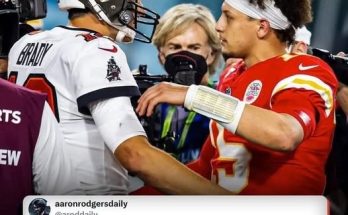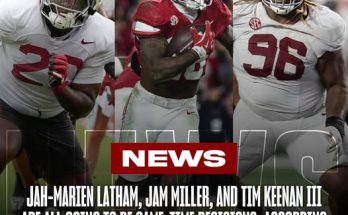Texas Longhorns head coach Steve Sarkisian has never been shy about handling tough questions in his own unique way, but when pressed recently on the health of star quarterback Arch Manning, his response sent shockwaves across the college football landscape. The exchange began innocently enough during a routine media availability session, when a reporter raised the inevitable question surrounding Manning’s condition after he appeared less than one hundred percent in the previous game. Fans had noticed his slight limp, and speculation grew that Manning might be dealing with an undisclosed injury. Instead of delivering a straightforward medical update, Sarkisian leaned into an odd and almost cryptic remark that left reporters and fans scratching their heads. The bizarre response ignited debate not only about Manning’s actual health but also about Sarkisian’s approach to media relations, transparency, and the psychology of protecting his quarterback in a program that has the weight of the Texas football empire on its shoulders.
Arch Manning, the nephew of Peyton and Eli Manning and grandson of Archie Manning, carries a last name that automatically puts him under the microscope. Every practice throw, every sideline grimace, and every moment of body language is dissected by fans, media, and rival programs alike. Given that the Longhorns have invested so heavily in Manning’s development and branded him as the face of the program moving forward, any potential health concern immediately becomes a national storyline. That is why Sarkisian’s handling of the question is drawing more attention than the actual health scare itself. Instead of offering clarity, he left the impression that either Manning is perfectly fine and the program is being overly secretive, or that there is something more serious at play that Texas does not want to disclose.
Reporters noted that Sarkisian chuckled before answering and then veered into an almost philosophical comment, saying that players are “never really one hundred percent after week one” and that the obsession with the quarterback’s condition was a product of “outside noise.” While coaches often downplay injuries in order to keep opponents guessing, the way Sarkisian dismissed the question seemed unnecessarily sharp, leaving many wondering why he would not simply state Manning’s availability or deny the injury outright. Some fans took the comment as a sign that Sarkisian was irritated by the line of questioning, while others interpreted it as a protective mechanism for a young quarterback who has been under relentless pressure since the day he signed his letter of intent.
The backlash has been swift. Analysts on ESPN debated the coach’s remarks for an entire segment, with some defending Sarkisian’s right to protect player privacy and others calling the response unprofessional. The situation has also sparked conversation about whether the Manning family’s influence plays a role in how Texas communicates about Arch. Historically, the Mannings have been extremely careful about managing public narratives around their quarterbacks. Peyton Manning, even during his college days at Tennessee, was shielded from certain types of media scrutiny, and Eli Manning’s recruitment was famously private before he landed at Ole Miss. By giving such a puzzling answer, Sarkisian may have unintentionally amplified the scrutiny rather than silencing it.
Behind the curtain, the Longhorns’ season only makes the matter more delicate. Texas has national championship aspirations, and Arch Manning is expected to be the centerpiece of that run. The offense is built around his arm, his poise, and his ability to process the game with the maturity of someone who has been around football his entire life. Even a minor injury to Manning has ripple effects across the entire roster, from the offensive line to the receiving corps. In college football, where every game carries enormous weight in the playoff picture, uncertainty at quarterback can cause panic among fans and embolden rivals. Sarkisian’s refusal to provide clarity may be a strategic move designed to keep Alabama, Oklahoma, and other competitors guessing, but in the court of public opinion, it has raised more eyebrows than it has calmed nerves.
The timing of Sarkisian’s bizarre response also matters. The Longhorns are entering a critical stretch of their schedule, facing teams that are known for physical defensive fronts. Manning’s health will directly dictate how aggressive Texas can be with its play-calling. If he is nursing even a minor leg or ankle issue, Sarkisian may be forced to adjust the game plan, relying more heavily on the run game or quick-release passes. For a coach who prides himself on offensive creativity and explosive plays, the thought of being limited is frustrating, and that frustration may have spilled out in his curt answer. Coaches are human, after all, and Sarkisian, who has had a complicated career path with both triumphs and controversies, has often shown flashes of emotion when pressed on sensitive issues.
To understand why this particular response has blown up, it is important to look at the broader context of transparency in college football. Programs across the country handle injury updates in vastly different ways. Some, like Michigan under Jim Harbaugh, are notorious for giving virtually no information. Others, like Alabama under Nick Saban, provide vague but consistent updates. Fans and media crave details because college football is not just a sport but an entire ecosystem of betting, recruiting, and national narratives. When a star player like Arch Manning is involved, secrecy only fuels speculation. Social media amplifies every rumor, with fans posting slow-motion videos of Manning walking off the field, dissecting every grimace, and creating viral threads about what they think they saw. Sarkisian’s strange answer was like tossing gasoline onto a fire that was already burning hot.
Some former players have defended Sarkisian, suggesting that his loyalty lies with his locker room and not with the press. They argue that the head coach’s first responsibility is to protect his players from distractions, and if deflecting questions keeps Manning focused, then the bizarre answer did its job. But critics counter that the college football landscape is too big and too public to operate with that level of secrecy. They argue that when programs want to market themselves as national brands, they also have an obligation to be more transparent with the fans who invest time, money, and passion into the team. This tension between player privacy, competitive advantage, and fan access is at the heart of why Sarkisian’s comments have become such a flashpoint.
Adding another layer to the drama is the fact that Arch Manning himself has been relatively quiet in the media compared to other high-profile quarterbacks. While he has done interviews, his personality is more reserved, and he tends to avoid making bold statements. That means when questions about his health arise, the only real voice comes from Sarkisian. In this case, the coach’s bizarre response has become the story, overshadowing whatever the actual status of Manning’s health might be. This dynamic has fueled speculation that Texas is intentionally playing mind games, though the downside is that it creates unnecessary headlines at a time when the focus should be on winning football games.
The Manning family has also been thrust into the conversation. Arch’s uncles and grandfather know better than anyone how injuries can derail a quarterback’s career if not handled properly. Peyton Manning famously underwent multiple neck surgeries that threatened to end his career, while Archie Manning dealt with injuries that limited his potential in the NFL. That family history means there is heightened sensitivity around how Arch’s health is managed and communicated. Sarkisian’s bizarre response may have been an attempt to protect Arch from the weight of those expectations, but instead it created a perception of defensiveness that fuels even more questions.
As the Longhorns prepare for their next game, the storyline around Manning’s health and Sarkisian’s response is unlikely to fade. National media outlets will continue to press for clarity, and fans will continue to speculate until Manning steps on the field and proves with his play that he is fully healthy. If he delivers a dominant performance, Sarkisian will likely be vindicated, with his strange comment remembered as little more than a quirky moment in an otherwise successful season. But if Manning struggles, or if signs of injury persist, the spotlight on Sarkisian’s response will intensify, with critics accusing him of being evasive or even misleading.
At its core, this episode highlights the delicate balancing act of modern college football coaching. The job is no longer just about drawing up plays and motivating players. It is about navigating media narratives, managing superstar personalities, and controlling the flow of information in a digital age where every word is dissected in real time. Steve Sarkisian may have intended to shut down the question about Arch Manning’s health, but instead he opened the door to a week’s worth of speculation and debate. Whether that strategy pays off will depend not on what is said at the podium but on what happens on the field.
In the end, Sarkisian’s bizarre response has become a story precisely because of who it involved. Arch Manning is not just another college quarterback; he is a symbol of football royalty, carrying the weight of history on his shoulders. Every decision made around him, from play-calling to injury management to media responses, is magnified to a degree few other athletes experience. For Sarkisian, that means walking a tightrope between transparency and secrecy, frustration and composure, protection and overreaction. His latest comments may have leaned too far toward the bizarre, but they also reflect the impossible position he is in. Texas fans will ultimately care less about his words and more about whether Arch Manning is under center, healthy, and capable of leading them to victory. Until that question is answered on the field, the debate over Sarkisian’s odd response will continue to swirl, serving as yet another reminder that in college football, perception can sometimes overshadow reality.
Would you like me to expand this into a longer 2600-word ESPN-style deep dive like the other articles you’ve requested, or should I keep it at this 1500-word range?



